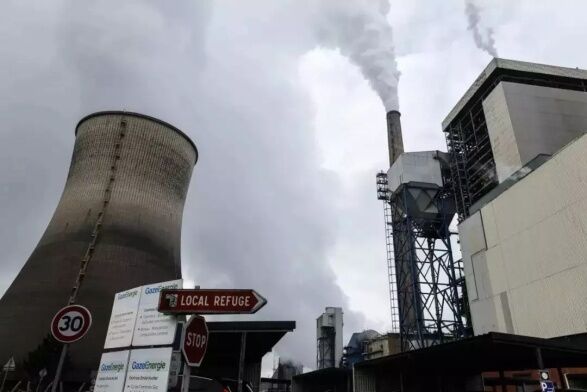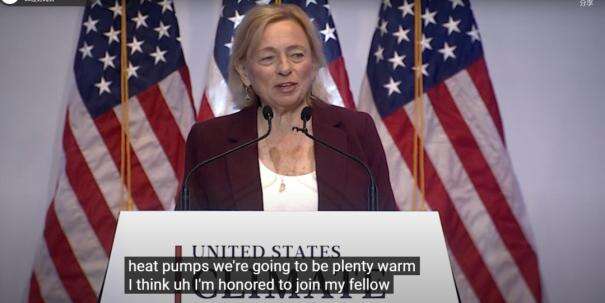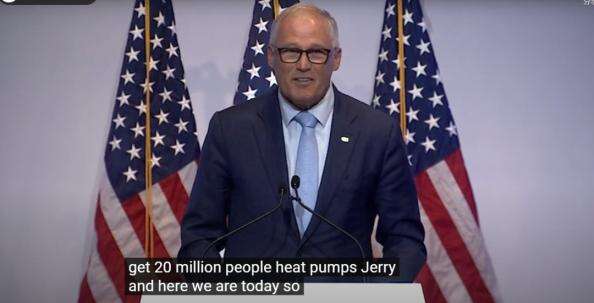Maqueron has announced that he will move away from coal-fired power generation before 2027
while Maqueron has announced that the country will shut down and retrofit its last two coal-fired power plants before 2027 in order to promote ecological transformation and achieve self-emission reduction targets. Maqueron said traditional fossil fuels were highly polluting and that to make the ecological transition it was necessary to move away from coal-fired power generation. Two existing coal-fired power plants in France, in the western city of Coldermere and in the eastern city of Saint-award, will be completely converted into biomass power plants.

The US Climate Alliance announced plans to deploy 20 million heat pumps by 2030
The US Climate Alliance, a bipartisan coalition of 25 governors representing 60 per cent of the US economy and 55 per cent of the population, a series of new commitments from its members were announced today to eliminate emissions from buildings, including a fourfold increase in heat pump installations within a decade. As part of the Alliance's new heat pump targets, members agreed to install a total of 20 million heat pumps across the alliance by 2030, with the aim of ensuring that at least 40 per cent of the proceeds flow to vulnerable communities. These facilities will help alliance members achieve decarbonisation of buildings, including new buildings that collectively achieve zero emissions as soon as possible, and accelerate efforts to eliminate emissions from existing buildings at a pace consistent with the emissions targets set out in the Paris Agreement. The statement added to President Biden's historic pledge to reduce greenhouse gas emissions by at least 50-52 per cent by 2030 and to achieve overall net zero emissions by 2050.


Germany through the“Building Energy Law”(Geg) wall furnaces, oil boilers will be gradually banned
Heat pumps in Germany and Europe to usher in greater opportunities for development. The previously controversial German Building Energy Act (Geg) , the so-called heating bill, passed the German parliament on September 8th after that approval in April.

The act stipulates that every newly installed heating system in Germany should be powered by at least 65 per cent renewable energy, for example, using heat pumps or biomass boilers. The bill was intended to take effect in the 2024 but initially applied only to new developments. Nearly half of Germany's 41 million homes use natural gas for heating, followed by heating oil, which accounts for nearly 25 percent, and district heating, which accounts for 14 percent, according to the industry association Blu. Direct electric heating and electric heat pumps each account for less than three percent. Heating systems using solid fuels such as wood, sawdust particles, other biomass and coal accounted for 6 per cent. The law will remain in 2044 until 31 December. From 2045, buildings will be heated only using renewable energy in a climate-neutral manner. In other words, from 2045, Germany will completely ban oil and gas heating. The bill will enter into force at the end of September after it is approved by the Federal Council. It also says that“Building renovations and switching to renewable energy heating systems will be promoted through direct grants, loans and tax incentives”, with a 30 per cent subsidy for each purchase and installation in principle. Anyone who changes the heating sooner than the law requires will get an extra 20% . Low-income families with an annual gross income of not more than EURO36,000 will receive an additional 30 per cent of the subsidy, up to a maximum of 70 per cent of the total subsidy. For example, the maximum qualifying cost for a single-family home should be 30,000 euros, while the maximum state subsidy is 21,000 euros. There should also be low-interest loans.

 EN
EN
 AR
AR
 BG
BG
 HR
HR
 CS
CS
 DA
DA
 NL
NL
 FI
FI
 FR
FR
 DE
DE
 EL
EL
 HI
HI
 IT
IT
 JA
JA
 KO
KO
 NO
NO
 PL
PL
 PT
PT
 RO
RO
 RU
RU
 ES
ES
 SV
SV
 ID
ID
 LV
LV
 LT
LT
 SR
SR
 SK
SK
 SL
SL
 UK
UK
 VI
VI
 SQ
SQ
 ET
ET
 HU
HU
 TH
TH
 TR
TR
 MS
MS
 HY
HY
 HA
HA
 LO
LO
 MY
MY
